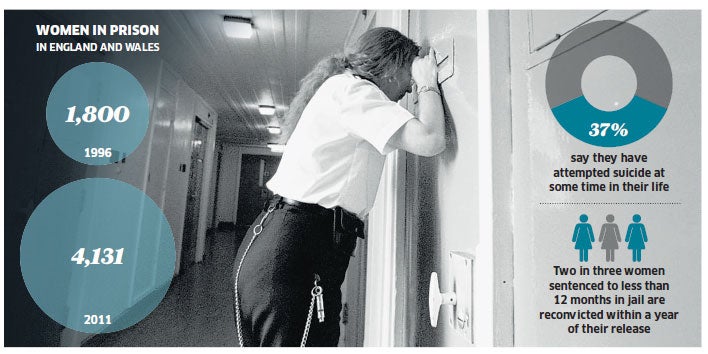Report proposes closing women's prisons

A plea for women's prisons to be shut and inmates switched to community programmes is to be delivered to the Government today by a powerful alliance of senior police officers, magistrates, economists and penal reformers.
They argue that the move would help to rehabilitate vulnerable offenders, cut crime and save money for the taxpayer.
Kenneth Clarke, the Justice Secretary, welcomed the report from the independent Women's Justice Taskforce and is expected to implement many of its proposals. But with law and order climbing the political agenda, he could run into resistance from the Cabinet's more hardline members.
His sentencing Green Paper, due to be published this month, will aim to stop the 'revolving door' of crime by diverting criminals with mental health, alcohol or drug abuse problems into treatment.
The female prison population in England and Wales stands at 4,100, more than double the number 15 years ago. Most inmates are serving short sentences for non-violent offences such as repeat shoplifting.
The taskforce, which was set up last year by the Prison Reform Trust (PRT) and was backed by the Association of Chief Police Officers, said Mr Clarke's plans to cut the number of jail terms under 12 months provided "a timely opportunity to look again at how women's justice is delivered".
It recommended that proposals to close some women's prisons be accelerated, with the money saved used to run community services for female offenders. The taskforce backed a drive to divert vulnerable women from crime in the first place by giving them help with housing and health problems.
It also called for a director of women's justice to be appointed to provide "clear leadership and accountability at a national level".
James Robertson, the former chief economist at the National Audit Office, concluded that investing in alternatives to custody for women could reduce offending and was ultimately more cost effective.
The average annual cost of a women's prison place is £56,415, while an intensive community order costs between £10,000 and £15,000.
Mr Robertson said women released after serving a sentence of less than 12 months were more likely to reoffend than those who received a community order.
John Thornhill, the chairman of the Magistrates' Association, said: "You are not going to save significant amounts of money unless you close whole prisons. We've got to do that by ensuring that for the short term offenders we have strong, challenging, and viable community programmes that they can respond to."
Juliet Lyon, the director of the PRT, said: "This sharp economic analysis and clear-sighted independent report should prove the catalyst for the national and local government leadership needed to reduce women's offending and drive women's prison numbers down."
Three weeks ago the Ministry of Justice (MoJ) announced £3.2m of funding to enable centres for female offenders to remain open in 2011-12. The taskforce described the move as "undoubtedly positive news", but warned: "The current situation of regular funding crises and last-minute rescues is counterproductive and should be resolved."
An MoJ spokesman said: "At the forefront of the justice system is the development of community based women's services, which aim to address the underlying reasons for many women's offending, such as drug and alcohol addiction, mental health and their often long histories of domestic violence and abuse. This work will continue."
Join our commenting forum
Join thought-provoking conversations, follow other Independent readers and see their replies
Comments
Bookmark popover
Removed from bookmarks